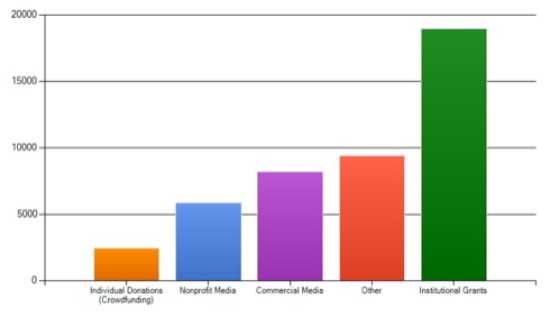Here at CJR, The News Frontier Database is our ongoing project to track and gather online news startups throughout the country. It’s slowly building, dozen by dozen, and we’re already starting to see some trends. For instance, it’s interesting to see how many outlets have received sizeable grants from charitable institutions, a much more direct and reliable source of funding than, say, Google Ads or corporate sponsorships.
A new survey compiled by Jeremy Adam Smith, a Knight fellow at Stanford University, shows us this trend isn’t just in our imaginations. (Via Mark Coddington.)
In Smith’s blog post about his survey’s initial findings, he wrote:
I took this on because I felt it important to break away from the obsessive focus on shiny new technology and failing business models. Instead, I wanted to examine how rising numbers of independent, entrepreneurial journalists are reinventing themselves and their work, and in the process sustaining journalism as a whole.
Smith reached out to journalists through several networks such as Knight and the Center for Investigative Reporting. In the end, 157 journalists responded to the survey, and 79 percent of those self-identified as freelancers or entrepreneurs.
As you might expect, most of the respondents cited “a desire to change the world in some way” as their motivation for engaging in journalism. “Financial motivations came in last by a very wide margin,” Smith writes. The respondents also favored audience engagement over money as indicators of journalistic success. Most reported being optimistic about their careers—though independent writers and entrepreneurs were markedly more positive than their full-time-staffed counterparts.
Most interesting, perhaps, were Smith’s findings about how these projects were funded. He summed it up this way: “According to the survey results, today’s meaningful journalism can best be characterized as nonprofit, collaborative, and cross-platform.”
One notable takeaway from the section on finance was that, given the “hope and hype” that surrounded the trend of soliciting individual voluntary donations to fund journalistic projects (“crowdfunding,” through direct contributions and through programs like Kickstarter), the overall impact of that method was actually the smallest out of every method of funding mentioned. The respondents seemed optimistic about its potential, but perhaps it had not yet been utilized to its fullest.
Funding from commercial sources, on the other hand—such as for-profit legacy media outlets—was seen by most as being on a steep decline. The biggest source of funding by far, for these respondents, was non-profit institutional grants. As Smith wrote:
While there has been a great deal of discussion about the decline of commercial media and the rising importance of grants and donations to meaningful journalism, I was personally shocked to see exactly how important institutional grants have become, at least for participants in this survey. The average grant contribution to these projects was at least twice that of any other source. The combined contributions of grants, donations, and nonprofit media dwarfed that of commercial media.
Here’s a graph of the figures Smith got back when he asked people to indicate, in dollars, how much each type of funding source contributed to the project they were working on. “Nonprofit media” in blue signifies organizations like ProPublica or Mother Jones, “commercial media” in purple signifies for-profit daily newspapers or radio stations, and “other” in red stood for things like Google Ad revenue, academic institutions, and—depressingly—the journalists’ own credit cards. The green bar, clearly the tallest by far, signifies money from institutional grants. Smith also points out that most of his participants predict that, in the next five years, both non-profit media and institutions will continue to play a bigger role in funding meaningful journalism, as commercial media will continue to diminish in importance.


